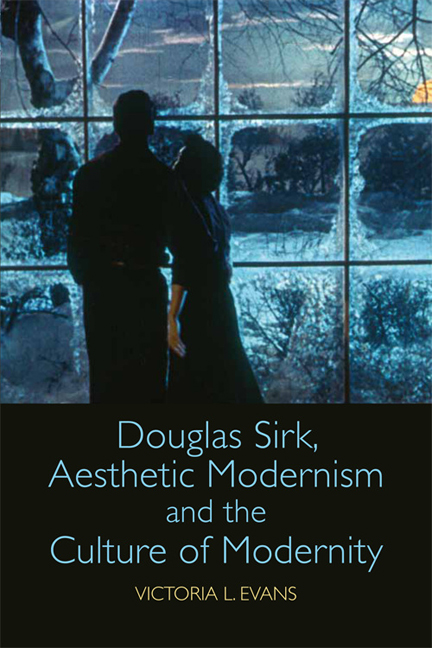Book contents
- Frontmatter
- Contents
- List of Figures
- Acknowledgements
- Introduction
- PART ONE SIRK AND THE VISUAL ARTS
- PART TWO THE SHOCK OF THE NEW: TRACES OF MODERNITY
- 3 The Invasion of Machines and Machine Culture
- 4 Imitation of Life and the Depiction of Suburban Space
- PART THREE TWO ARCHITECTURAL CASE STUDIES
- Bibliography
- Index
3 - The Invasion of Machines and Machine Culture
from PART TWO - THE SHOCK OF THE NEW: TRACES OF MODERNITY
Published online by Cambridge University Press: 20 December 2017
- Frontmatter
- Contents
- List of Figures
- Acknowledgements
- Introduction
- PART ONE SIRK AND THE VISUAL ARTS
- PART TWO THE SHOCK OF THE NEW: TRACES OF MODERNITY
- 3 The Invasion of Machines and Machine Culture
- 4 Imitation of Life and the Depiction of Suburban Space
- PART THREE TWO ARCHITECTURAL CASE STUDIES
- Bibliography
- Index
Summary
According to Ben Singer, a widespread fear of increasing social chaos, of the inevitable uncertainties of fate and of exposing ourselves to unknown dangers has been a staple of the melodramatic form since at least the turn of the twentieth century. In particular, Singer has meticulously documented an all-pervading fear of the machines that have come to symbolise the accelerated pace and bodily perils of modern life. While many previous scholars have built upon Georg Simmel, Siegfried Kracauer and Walter Benjamin's ‘neurological conception of modernity’, the notion that the metropolitan environment is constantly bombarding us with perceptual stimuli that subject our senses to a ‘barrage of shocks, impressions and jolts’, Singer also highlights the increased possibility of experiencing actual physical maiming and death. In my view, many of Sirk's most accomplished works exhibit a similar sense of anxiety, a dread that would have been further exacerbated by the almost unimaginable carnage of World War I. Nevertheless, many of these films also contain traces of the early twentieth-century avant-garde's ‘machine euphoria’, the concomitant belief that the new technology might enable us to change society for the better as well as for the worse.
Singer based his fascinating conclusions upon a detailed investigation of a wide range of middlebrow commentaries published between the late 1880s and 1920 that included ‘cartoons [appearing] in the illustrated press (both in comic magazines such as Puck, Punch, Judge and Life and lowbrow sensational newspapers such as New York's World and Journal)’. Apparently, his scrutiny of this broad cross-section of popular periodicals yielded innumerable accounts of the wholesale slaughter that was supposed to be taking place on the city streets. For instance, in 1905 Henry Adams observed that ‘[against the metropolis] Nature violently revolted, causing so called accidents with enormous destruction of property and life … The railways alone approached the carnage of war’. Singer would go on to persuasively link this obsession with the ‘horrific’ side effects of mass transportation and production with a ‘cultural uneasiness surrounding the onset of urban modernity’.
- Type
- Chapter
- Information
- Publisher: Edinburgh University PressPrint publication year: 2017



